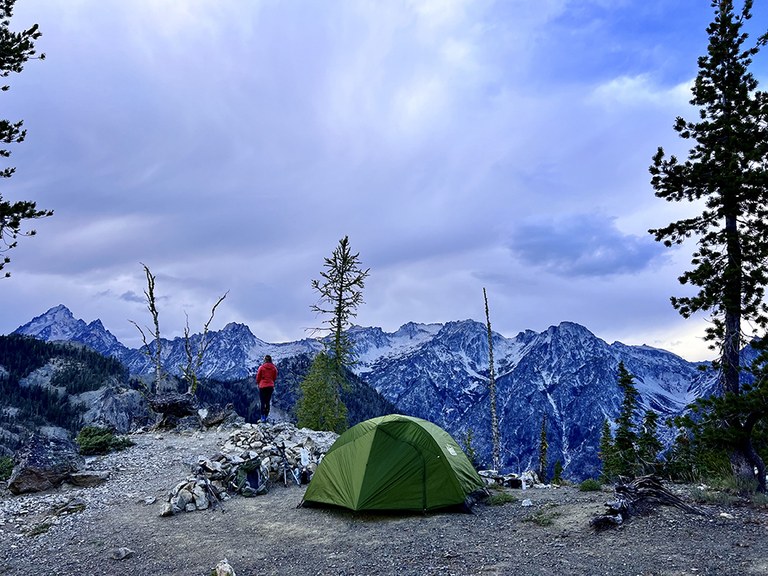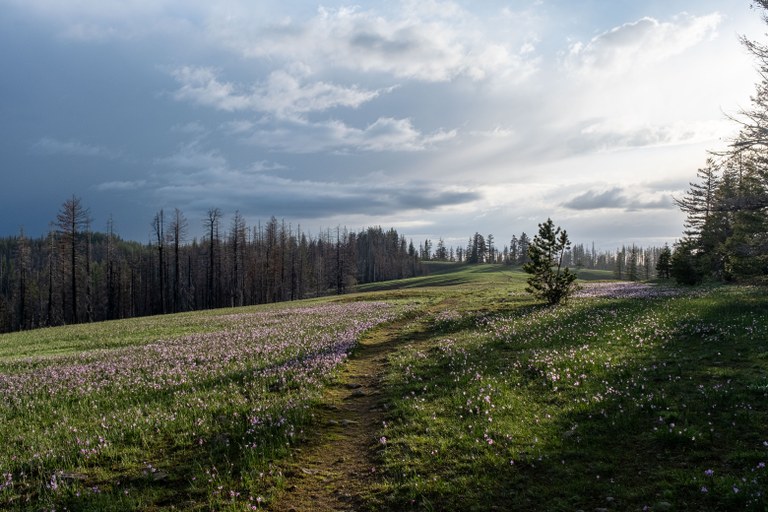 Washington Trails
Association
Washington Trails
Association
Trails for everyone, forever
The administration’s actions are making it nearly impossible for the U.S. Forest Service and other land managers to do their jobs, leaving hikers less safe and reducing access to public lands. By Jaime Loucky.
Access to public lands, including for recreation, is rooted in the understanding that public lands belong to — and benefit — everyone. Right now, though, national public lands — and all of the benefits they provide to people’s health, the economy and the environment — are at risk. The agencies that manage national public lands, including the U.S. Forest Service, are facing a crisis of funding and staffing.
Across the nation, the Forest Service has lost some 5,200 people since February, leaving the agency severely understaffed. National forests in Washington have lost about 25 percent of their staff, and that lack of adequate staffing is going to be obvious as you get outside this summer.
The Forest Service is being set up to fail — it cannot effectively do its job under these conditions.

In Washington, the Forest Service manages more public land than any other agency. More than 9,000 miles of trail cross those lands, including in some of our state’s most iconic places. But those places need the trusted, expert staff of the Forest Service to help steward them, so they will still be iconic and healthy in the years to come.
Without Forest Service employees, we won’t have maintained forest roads, trails, bridges or signage. They help ensure human waste is dealt with appropriately. They fight fires and respond to emergencies. They patrol popular recreation areas and remind visitors how to visit responsibly. They staff visitor centers and give out expert information. These are talented, knowledgeable people who have devoted their careers to serving the public and maintaining the landscape we know and love.
In many places this summer, those staff simply won’t be there. In the Enchantments, a beautiful and delicate alpine area where managing trails, the flow of visitors and backcountry toilets is an enormous job, the number of rangers has been cut from 13 to one.

These unprecedented cuts make hikers and other recreationists less safe in the outdoors and put our landscapes at greater risk of damage. With fewer Forest Service employees, visitors to forests are going to be at increased risk from wildfires and other emergencies. They will also have less access for recreation. Hikers can expect trails blocked by logs and overgrown with brush, locked or less-frequently cleaned toilets and overflowing trash cans. Maintenance work, like repairing broken bridges, will remain undone.
While WTA and our dedicated volunteers can help close the gap on some trail work, we can’t do that work without our partners at the Forest Service. They identify high-need areas, coordinate across organizations, provide pack-animal support and materials and have a long-term understanding of issues that need to be addressed.
WTA is committed to stepping up, but we and other nonprofits are struggling with the lack of clarity, reduction in staff and frozen funding. The administration’s many changes mean we don’t know if or when federal funding will be available to support our work — or which of our long-time federal partners will still be with the agency. Even now, we often have a hard time getting someone on the phone.
We are doing what we can to plan through the chaos, and to prioritize work that addresses the biggest needs in national forests. But so much of the work that the Forest Service does can’t be replaced by volunteers. Employees have scientific knowledge and expertise that goes far beyond what any nonprofit could do. And the public trusts their expertise. In addition to providing information to hikers, managing waste and doing trail work, Forest Service employees combat invasive species, conduct research to determine if wildlife populations are healthy and protect public lands from wildfires. They balance conservation and resource use needs, providing long-term benefits for everyone.

National public lands are one of America’s best ideas — selling them off is one of the worst.
In May, the U.S. House Committee on Natural Resources introduced legislation to sell off thousands of acres of public land in Utah and Nevada. Ultimately, that provision was removed from the House bill. But then, the Senate Committee on Energy and Natural Resources released the text of a spending bill that would mandate the sale of up to 3.2 million acres of national public lands, managed by either the U.S. Forest Service or Bureau of Land Management. If this bill becomes law, national public lands would be sold in 11 western states, including Washington.
Maintaining public lands is an investment in the long-term health of our natural landscapes and in the communities that use them. Public lands support clean air, clean drinking water, wildlife habitat and climate resilience. Selling them off, on the other hand, prioritizes quick profits and makes it harder for the public to access land.
Access to public lands is a vital part of living in Washington, and it generates enormous economic and health benefits to Washingtonians. Many people live here because they enjoy the quality of life provided by access to a diversity of beautiful outdoor places. And that time in nature has measurable benefits to our physical and mental wellbeing. Trail use results in over $390 million in health savings each year in Washington state.
Additionally, outdoor recreation contributes $1.2 trillion to the national economy, including $22.5 billion to Washington’s economy. It also supports over 120,000 jobs in our state, and is an important part of the livelihoods of people in rural communities.
Even if you never visit public lands, you are benefiting from them. The administration’s efforts are putting all of these benefits at risk.
This summer, you’re likely to see the impacts of these federal agency cuts on national public lands. If you see trash, closed visitor centers, downed trees or other issues on public lands and trails, it won’t be because those spaces are badly managed. It will be because the people who maintain those lands are being forced to do their jobs with a tiny, ever-decreasing fraction of the staffing and funding that they need. When you see these folks working, please show them patience and respect.
National public lands play a crucial role in preserving our natural and cultural heritage, fostering public health, supporting local and rural economies and contributing to the fight against climate change. And, if we want them to remain a space of healing and inspiration, clean air and clean water, we all have to speak up.
You can help by making your voice heard. Write to the administration or the editorial board of your local newspaper, talk to your friends, make a case for the value of these lands wherever you can.
We need to work together to defend the public lands we love, and the agencies that maintain them. Now is the time. These landscapes need our support now more than ever.